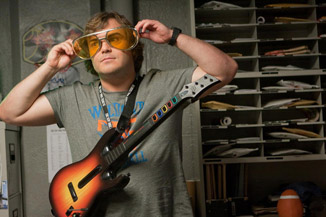|
|
Book vs. Movie: Gulliver's TravelsBy Russ BickerstaffDecember 28, 2010
Where the book is content to be clever and fantastical in great detail for a weighty number of pages, the film has places to go, things to do and demographics to appeal to. In the first act, we see a lovable slacker thrust into an adventure. In the second act, we see that slacker become the heroic champion of those people by averting fiery disaster and securing a major naval victory. That second act (roughly 30-60 minutes into the story) more closely resembles the book than the rest of film. The final half hour sees a high-ranking Lilliputian siding with the Blefuscudians in a successful effort to banish Gulliver to Brobdingnag. The land of giants isn’t given much space in the film at all. Gulliver’s lies to the Lilliputians about his stature in New York and his life’s accomplishments are revealed in a dramatic moment. His love interest, having discovered lies of a different kind, has traveled out to become stranded on Lilliput and become a prisoner there. Gulliver feels insignificant — a feeling that is mirrored in his stature on the Brobdingnag as he becomes a doll for a young girl. Naturally, everything works out in the end. This is a Hollywood film after all. The Verdict Though slow and plodding, Jonathan Swift’s original novel held just enough innovation to make it a classic. As the book is buried in very specific and intricate satire, it doesn’t seem likely that Swift was making a deliberate effort to appeal to a wide range of readers with the novel. In spite of this, the book has had the kind of universal appeal reserved for those works that have achieved success all over the world. By contrast, the film seems to be deliberately reaching for a universal audience in a very awkward way. The romantic comedy element seems to be reaching for date movie status while the humor feels quite squarely aimed at sixth grade boys. It’s a bit difficult to discern exactly who the film is being aimed at. As the film limited itself to the first two parts of the book, a sequel could, theoretically, have covered the final two parts of the book. It’d be interesting to see Jack Black explore the character a little more, but as the film is likely to be one of the bigger flops of 2010, Black will need to seek commercial success elsewhere.
[ View other columns by Russ Bickerstaff ]
[ View other Book vs. Movie columns ]
[ Email this column ]
|

|
|
|

|
Friday, April 19, 2024
© 2024 Box Office Prophets, a division of One Of Us, Inc.


